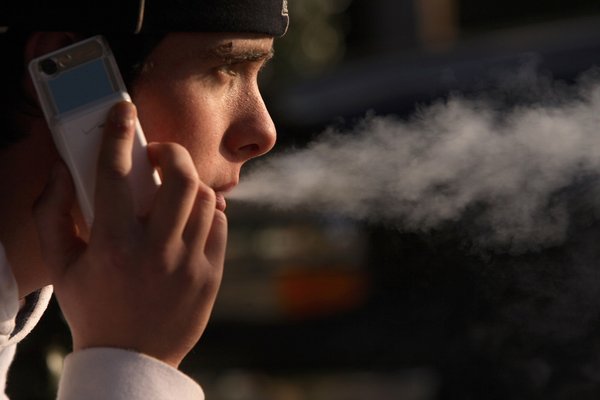'Cowboys get cancer, too,' says speaker at smokeless tobacco summit in Missoula
By Alice Miller
For nine months, James Capps didn’t have a bite of food. He had to pour nutrition drinks into a feeding tube to get nourishment while he underwent and recovered from treatment for oral cancer.
Smokeless tobacco is dangerous, and Capps’ story is the testament.
Capps is featured in a short video and advertising campaign in Oklahoma that shares his story. After the video’s first week on television, the number of people requesting tobacco-cessation aids jumped 300 percent.
Capps said he loves his new role as an advocate and hopes his story gives people the push they need to quit.
“You don’t need that crutch to be someone you want to be,” he said. “You should do it without tobacco.”
Capps traveled to Missoula from his hometown of Atoka, Okla., to receive the Cliff Niles Creative Media Award during the seventh National Smokeless and Spit Tobacco Summit, held at the University of Montana this week.
The summit, held every other year, focuses on prevention and research about smokeless tobacco. Hundreds of people from around the country are attending the summit, which features more than 70 presentations.
UM’s College of Health Professions and Biomedical Sciences hosted the event and received $32,250 from the National Association of Chronic Disease to plan the summit, which is the only national conference of its kind.
Smoking takes center stage when people talk about tobacco use, said Patricia Nichols, an independent consultant for Montana’s Tobacco Use Prevention Program and co-chairperson of the summit’s smokeless advisory board.
However, smokeless tobacco is just as dangerous. It causes cancer and contributes to cardiovascular disease, Nichols said.
“We want people to know that this isn’t a safe habit, even if your grandpa did it,” she said.
Smokeless tobacco use tends to be more common in rural areas because it allows manual laborers to get the kick tobacco provides without tying up their hands, she said.
And smokeless tobacco requires people to spit.
“Which is a lot easier in rural locations,” she said.
***
Tobacco companies are constantly putting new products on the market, she said, and the rise in smoke-free public spaces and businesses equates to a resurgence in use of smokeless tobacco products.
As with other tobacco products, companies are targeting the younger generation, because they need more people to replace those who have quit or died, Nichols said.
One way Montana is fighting back against tobacco company advertising to younger people is through a tobacco-free rodeo program.
In 2010, the Montana High School Rodeo Association agreed to the Montana Tobacco Use Prevention Program’s request for the organization to adopt a more stringent tobacco-free policy, said Crissie Hansen, a prevention specialist out of Dillon.
Most parents, rodeo workers and fans abide by the policy, which prohibits tobacco use by anyone during rodeo events.
“We really have not had any friction on it,” Hansen said in response to a question about community feedback on the policy during a presentation Tuesday at the summit.
In addition to the policy, about 200 rodeo athletes have taken a pledge not to use tobacco. Athletes must sign the pledge if they want to participate in the reACT rodeo series and have a chance at end-of-season prizes. reACT is a student-based program advocating against tobacco use.
The rodeo program is a way for health workers to reach kids where they play – venues where tobacco companies have traditionally excelled, said Alison Reidmohr, a health educator with the Montana Tobacco Use Prevention Program.
Changing how kids look at tobacco and its use helps alleviate peer pressure to do something that has been associated with the rodeo scene, she said, adding some athletes are sharing their personal stories through commercials.
***
Capps, the Oklahoman who’s speaking out against smokeless tobacco, said he knows well the pressure cowboys feel to use tobacco.
Capps was hooked by the time he was 15, and he began dipping because that’s what every good Oklahoma cowboy did.
“So I thought dipping snuff was the way to fit in,” he said.
Girls thought it was nasty.
“Well, we’d just get another girlfriend,” he said.
Thirty years after he began dipping snuff, Capps got oral cancer at the base of his tongue. Because doctors couldn’t get to the tumor surgically, they put a port in his neck and pumped chemotherapy drugs directly to the tumor – 24 hours a day, seven days a week for seven weeks.
He received radiation therapy five days a week over the same time. Now, he has difficultly speaking, suffers from dry mouth and must wash down every bite of food with water.
The risks of getting cancer were there for him to see.
“I believe everybody knows there’s that chance,” he said. “But the key thing is this: It will never happen to me.”
Today, Capps knows differently.
“Now I know cowboys get cancer, too,” he said.
http://missoulian.com/news/local/cowboys-get-cancer-too-says-speaker-at-smokeless-tobacco-summit/article_5445e1e2-ff04-11e2-b71d-0019bb2963f4.html

